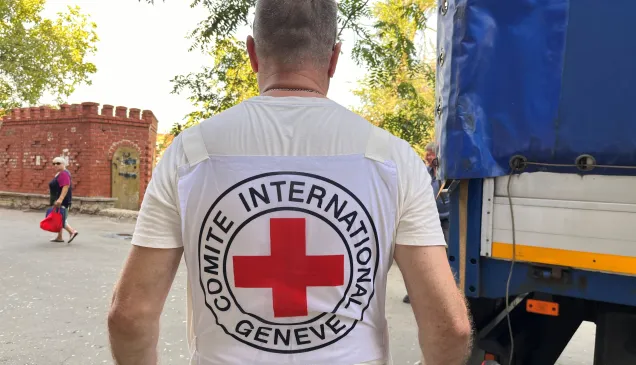Speech by Hugo Slim to the UN Economic and Social Council Humanitarian Affairs Segment
This year is the 70th Anniversary of the adoption of the Geneva Conventions.
The Conventions were agreed with the reality of World War 2 fresh in people's minds and in universal recognition of people's urgent need for protection and assistance in war.
Our collective challenge 70 years on – as States, belligerents, humanitarian and development actors - is to ensure respect for the law in the reality of war today.
Some specific challenges have emerged on today's battlefields that require particular attention:
- There is a significant increase in the number of warring parties, often fighting in complex coalitions.
- The military use of force co-existing with criminal and inter-community violence.
- A combination of virtual and physical violence that may pose additional challenges.
- The double impact of climate risk and armed conflict that is compounding the vulnerability of civilians.
The intermingling of armed actors and civilians remains a daily problem.
These trends are most evident in warfare in densely populated urban areas. They cause death and injury to many civilians, and destroy and disrupt economic, water, health, and electricity systems.
The ICRC is constantly concerned about the use in populated areas of explosive weapons with wide-area effects. They are a major cause of harm to civilians that is both physical and psychological.
We call on all parties to armed conflicts to avoid using explosive weapons that have a wide impact area in populated areas, due to the significant likelihood of indiscriminate effects.
Urgent changes in military policies and practice are crucial for lowering the risk posed to civilians by such use of these weapons. Too often, enemies deliberately shield their military activities in populated areas, endangering civilians.
Such behaviour does not relieve opposing military commanders of their responsibility to minimize the incidental effects of their fire on civilians. Indeed, such responsibility is heightened in densely populated areas.
Today's urban warfare confronts humanitarian and development actors with harm to individuals and deep structural degradation of infrastructure and social systems in urban areas.
People's needs in these degraded urban areas go beyond simple emergency assistance.
Basic services need to be rehabilitated and maintained. Chronic, pre-existing and non-communicable diseases need to be treated. Children need to go to school safely. Adults need jobs. And families need homes.
These needs are individual and collective. They are short, medium and long term; and they are physical and psychological.
This is what implementation of the law looks like in practice today. These are some of the challenges to the protection IHL was designed to provide.
We call on States and all parties to conflict to unequivocally respect, implement, and ensure respect for the Geneva Conventions and wider IHL.



